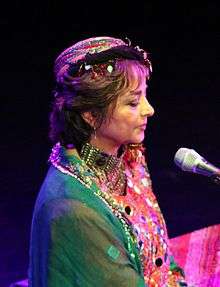Sima Bina
| Simā Binā | |
|---|---|
 | |
| Background information | |
| Origin | Birjand, Iran |
| Genres | Persian traditional music |
| Occupation(s) | Singer of Folkloric songs |
| Years active | 60 years |
| Website | Simā Binā |
Sima Bina (Persian: Simā Binā) (born January 4, 1945 in Birjand, Iran) is notable Persian classical musician, an Iranian composer, researcher, painter and teacher, described by Radio WDR Germany as the „grand lady of iranian folk music“, a leading Iranian classical singer and songwriter. A lifetime of dedicated work on Persian folk music has made Master Sima Bina a legendary character in the history of Iranian music Since 1993 she has accepted invitations to perform her music worldwide in prestigious festivals and organized concerts Persian classical musician.[1] She is currently living in Cologne, Germany and Tehran, Iran.
Master Sima Bina’s career in the performing arts has spanned 5 decades. Born in Khorasan, in the heart of a popular tradition, she started her career on Iranian radio at the age of nine, under the direction of her father, Ahmad Bina – a master of Iranian classical music and poet who wrote many of her early songs.
She studied the repertoire of learned music “radif” and singing technique with great masters such as Maaroufi and Zarrin Panjeh. She went on to acquire her own solo programme, Golhaye Sahraii (Flowers of the Desert), presenting a collection of folk songs and music from various regions of Iran, which is still remembered today. After graduating from Tehran University in 1969, majoring in Fine Arts, Sima Bina continued and perfected her knowledge of radif with the highly subtle teaching of great Master Davami.
Her main focus is Iranian folk and classic music. Master Bina has been able to gather and revive a collection of almost forgotten Iranian folk songs and melodies. A captivating vocalist, Master Sima Bina is one of the leading exponents of the traditional music of Iran. For decades she has done extensive research on Persian folk songs, collecting, recording, writing and re-interpreting popular regional music. Her works cover the whole spectrum of Iranian folk music including Mazandarani music, Kurdish music, Turkmen music, Baloch music, Lor music, Shirazi Music, Afghan Music, Bakhtiari Music, north and South Khorasan.
- Iranian Lullabies
While pursuing Iranian folksongs, Master Sima Bina often came across a variety of ethnic lullabies which she added to her collected works. This collection finally led to her book, Iranian Lullabies in 2009. In this book, Master Sima Bina not only shares her findings, her perception, the scores and visual expression of the selected lullabies with mothers, she also presents forty original Iranian lullabies in four CDs in which her vocal is sometimes blended with the singing of the mothers who had song the lullabies to her in different parts of Iran.
The worldwide recognition her music receives today is the materialization of over forty years of her devotion to Iranian music.
„Master SIMA BINA`S music feeds my soul." (The Gilded Serpent)
"...she has gained a unique position in the history of persian music." (World Music Central)
See also
References
- ↑ "نگاهی گذرا به زندگی سیما بینا". DW.DE.
External links
- Official website
- Simā Binā shop
- Official Facebook Fanpage
- Official Instagram Fanpage
- 50 Iranian Women you Should Know: Maestra Sima Bina
- Sima Bina sings some Khorasani and Mazandarani folk-songs, 2007, YouTube:(7 min 33 sec); (3 min 48 sec); (7 min 12 sec).
- Sima Bina sings Aziz Beshi[n be Kenārom (My Love Sit Next to Me)] on YouTube: (4 min 30 sec).
- (Persian) Bahār Navāi, Motherly Hums
Audio slideshow (6 min 31 sec). - مستند دویچه وله درباره بانو سیما بینا، بانوی نتهای گمشده
- در اتوبوس مسافربری • پای صحبت بانو سیما بینا
- نشست پزشکان ایرانی در آلمان با موضوع اخلاق و علم و اعطای نشان به بانو سیما بینا
- Simā Binā shop